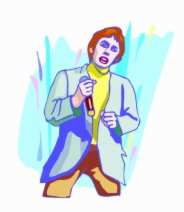Click for FREE newsletter & bonuses!
Feldenkrais Therapy - Ideas To Help YOUR Singing!

For the "ALL ABOUT SINGING" PODCAST #2 -
I spoke with Alan Fraser, a well-known pianist and a long-time practitioner of Feldenkrais Therapy, a method of body work.
We spoke about many issues that affect singers: how to stand in order to reduce tension, how to breathe more deeply by freeing the diaphragm, how a reduction of tension can "free" the soul for singing....
You can listen to the PODCAST on Feldenkrais Therapy and READ ALONG WITH PART THREE below - as you listen to the MP3!
READ PART ONE
HERE.
About Feldenkrais Therapy - Interview with Alan Fraser

_____________________________________
Alan Fraser: Well let's get back to this, what did you call it, a “cash register” movement?
Barbara Lewis: Yes. When the jaw juts out I say, "Oh, you've got your cash register working again."
Alan Fraser: Yeah. So it juts out and up, right?
Barbara Lewis: Out and up.
Alan Fraser: Yeah. Exactly. Okay, so the normal way to correct this…an understandable way to correct this would be, 'Okay, now I'm going to have my jaw way down and I'm going to strengthen my neck.
Barbara Lewis: Right.
Alan Fraser: Or open my neck out. But that's a very, very big movement. And unfortunately when the conscious mind tells the motor system to do that, as soon as the conscious mind forgets about telling the motor system to do that, actually you go back to your bad habit.
Barbara Lewis: Okay.
Alan Fraser: So the jaw will jut out again. Because that's an unconscious movement that's based on years and years of patterns and years and years of a certain style of using oneself. But if I, instead of counteracting that cash register movement by going you know completely in the opposite direction. If I, for instance, I just counteracted it by a movement of my chin one millimeter in the other direction…that already creates a huge change in the neurology…
Barbara Lewis: Oh.

FELDENKRAIS THERAPY and TINY MOVEMENTS THAT COUNT...
Alan Fraser: In the neural organization. You can…I don't have to go completely in the opposite direction. If I simply change the direction I could go even a half a millimeter but now all my muscles are organized for movement in a different direction. The sensation of the whole neck area is completely different. Then I might also do another thing. I might actually instead of trying to reduce that movement I might try to increase it. And I might move my jaw a millimeter further into the cash register. And this does something really fascinating. It…what you're doing now is that there are certain muscles that are pulling your jaw in that direction and now you…another part of you is taking over that work. And so they feel now the conscious mind is doing cash register instead of the unconscious mind and the unconscious part of the brain says, "Oh, somebody else (it's like it's another person) has taken over this movement and I can let go of this habitual pattern, so…
Barbara Lewis: Oh…
Alan Fraser: So you nudge yourself a little bit further in to the cash register and then you wait for a change in sensations through the neck and then if you do it gently enough you come back to the neutral and you'll find that you've been freed to some extent of the unconscious cash register reflex.
Barbara Lewis: That's really fascinating. So these very small changes can make a difference to the brain and to future function.
Alan Fraser: It's because they're small that they work because the brain…the brain works on electricity, right? But it doesn't work under the level of electricity needed to run an electric pump or something. It works on the level of electricity that goes from your computer key to the processor when you hit the letter A or whatever…it's minute. And so you have to…you enter a whole new world when you reduce your movements but also direct your attention to the minutiae of the sensations that accompany these minor changes of movement.

FELDENKRAIS THERAPY - ZEROING IN ON A SINGER'S NEEDS
Barbara Lewis: Is this how you would work with a singer if you had a singer in front of you who is having trouble with some aspect of singing? Would you try to zero in on a physical movement that you think is not correct?
Alan Fraser: Absolutely. And it's not even a degree of correctness or incorrectness. It's a degree of usefulness and it's also a question of basic degree. Like many movements are incorrect only because they're done too much.
So, you don't want to just train yourself never to do the cash register movement, what you want is choice. You want to be able to move your chin a little bit in - a little bit out, a little bit over here. And for your…all the aspects of your neuromotor functioning that's the way the muscles are moving the bones to be able to adjust in a harmonious way to each new position. Then you have choice. You have freedom, actually…not locked into habitual patterns.
WHY DID ALAN, A MUSICIAN, CHOOSE FELDENKRAIS THERAPY?
Barbara Lewis: Right. Tell us what drew you, as a pianist, as a young pianist, because I think you were quite young when you got interested in Feldenkrais. What drew you to the Feldenkrais method?

Alan Fraser: Well, it was actually a singer.
Barbara Lewis: Oh, really? (laughs)
Alan Fraser: And the singer was my brother.
Barbara Lewis: Oh, okay.
Alan Fraser: My brother was studying with Alan Fast, who's a countertenor in Montreal. And my brother Scott, we were playing tennis and he…all of a sudden I realized, “My God, he's not the sullen adolescent.” He's like standing with a full open chest and it's not held there - it's just comfortably there instead of this sunken chest and dropped head…
Barbara Lewis: Which was his habit. That's how he usually was?
Alan Fraser: Yeah. Exactly.
Barbara Lewis: So you saw this transformation?
Alan Fraser: Yes. I asked, "So what happened to you?" and he said Feldenkrais, and he moved his hip in a perfect circle. And I was like, "What's that?"
Barbara Lewis: (laughs)
Alan Fraser: I was so impressed with the change that I started going to Phillipe Leblanc to take private lessons and I did that for about a year and then I realized, my God, there's so much to be desired in the techniques of so many pianists. I mean we all…we harken back to the great pianists of the past who had this wonderful tone and rhythmic flexibility and expression and…
Barbara Lewis: Did you see a lot of change in your own piano playing in that first year?
Alan Fraser: A quantum leap.
Barbara Lewis: A quantum leap?
FELDENKRAIS THERAPY FOR THE "SOUL"
Alan Fraser: It was a change in the sound and it was a change in my emotional expression. It's as if when I had a skeleton that's working for me then somehow it served the needs of my soul more. I hope I'm not getting…
Barbara Lewis: Wow, that's…
Alan Fraser: …too esoteric…
Barbara Lewis: No, I think that's great. Singers are really going to relate to the needs of the soul. This is what we're dealing with all the time. How to use music and words to create the feeling that feels right to us.
THIS IS THE END OF PART THREE OF THE INTERVIEW ABOUT FELDENKRAIS THERAPY and how it relates to SINGING - YOU CAN READ THE FINAL PART HERE as you continue listening to the MP3. Click now to enjoy this fascinating interview...
Back from Feldenkrais Therapy to Singing Tips with Barbara Lewis

AFFILIATE PRODUCTS. Now and then, in my articles I recommend products that I believe in. If you buy something through one of those links, I receive a small commission. But there is no additional cost to you. Your purchase simply helps me to continue building this web site with free content.
Visit the Barbara's Vocal Guide Shop! E-Guides. Music.
Get Free Video Lessons with Barbara on her Youtube Channel







